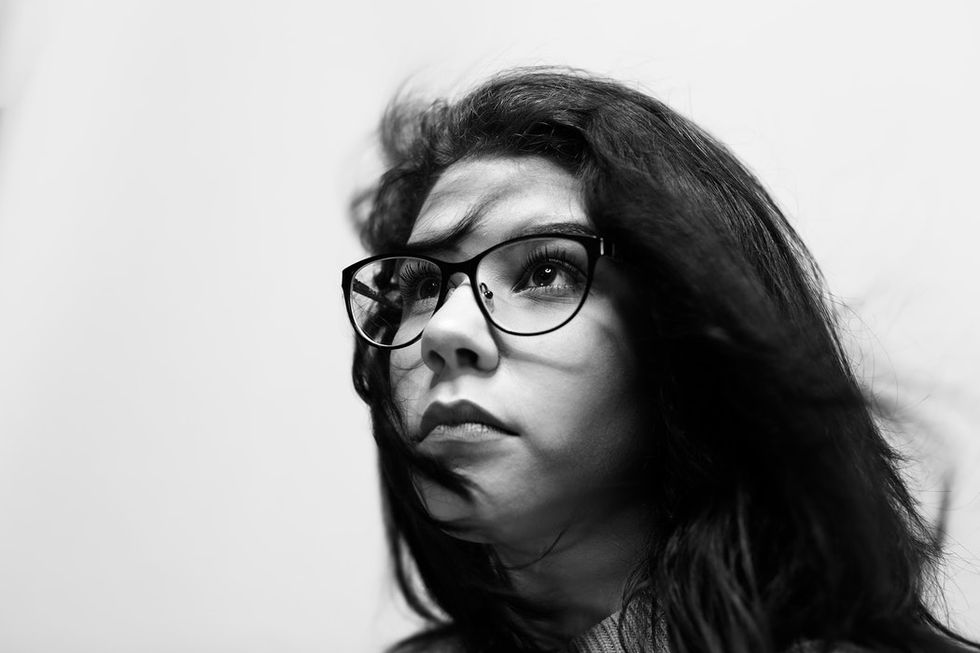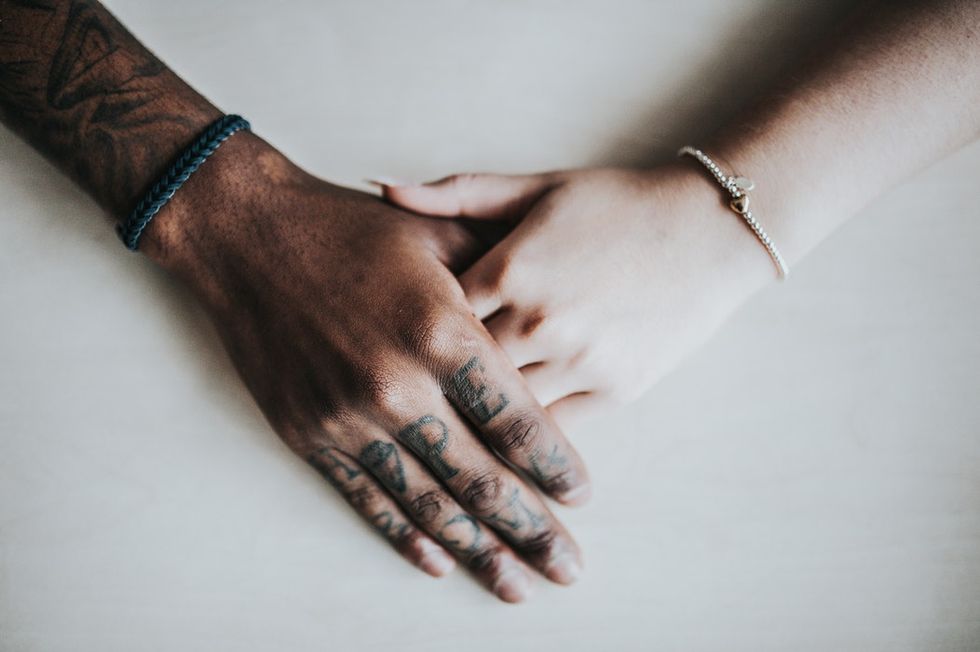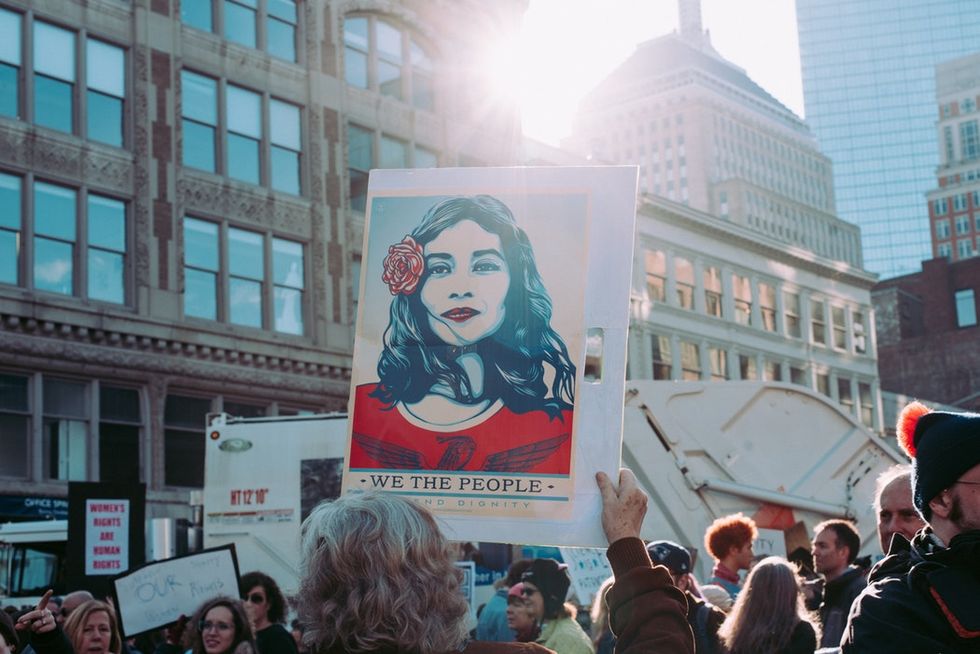It was not so much with surprise as it was with irritated amusement that the world awoke to the news that Donald Trump had declared himself, well, very much not a feminist. In an interview with Piers Morgan on the U.K.'s ITV last week, President Trump said, "I wouldn't say I'm a feminist. I mean, I would think, maybe, that would be going too far." Maybe! Maybe going too far. And yet, Trump continues, "I'm for women, I'm for men, I'm for everyone."
Well, then. That certainly sounds feminist. And if it sounds like feminism, looks more or less like it, and could probably be mistaken for it, then I would go so far as to say that it is, in fact, feminism. Modern-day, or third-wave feminism, has expanded to include not only fighting the past and current oppression of women (yes, we are still dealing the ramifications of centuries of global sexism, sexual objectification, and gender violence—and yes, these still exist), but of men, and of minority groups, such as the LGBTQ+ community and POC, or people of color. Intersectionality, or the concept that the marginalization and discrimination of a variety of people (be it in sex, ethnicity, or class) are best understood as intersecting (instead of separate cases), is a much a part of the modern understanding of feminism as the general "political, economic, and social equality of the sexes," or how Merriam-Webster defines their 2017 word of the year.
With this in mind, it's hard to think that anyone would not want to be a feminist. Even within feminism itself, within the social and intellectual community, I find there are varying degrees of solid agreement on social issues, politics, theory, and so on. For example, I myself am pro-life and have my own reasons for being so. We can discuss and debate and make our case. But that doesn't make us any more or less of a feminist. There is space within feminism for a myriad of people to occupy—it, at its most basic, advocates for equality. How you define "equality" appears to be the issue.
Of course, if you believe that men and women aren't equal; if you think that discrimination in the workplace and beyond is fictional; if you think that "locker room talk" portrays man's natural state; if you think that men cannot express anything contrary to the masculine; if you think racism does not still permeate every single social and institutional space in the U.S. and beyond; if you think the thoughts and opinions of the LGBTQ+ community are invalid, if you think THEY are invalid; of course you wouldn't go so far to call yourself a feminist, your idea of equality is, well, not the right definition for this discussion.
If you feel as though your rights are infringed upon, and feminism is to blame, then you must understand that it is the framework of your worldview which causes the need for feminism.
And if you believe feminism has already done its job and should no longer be dealt with, then you not only disrespect the women who paved the way for 56% of students at college nationwide, but you disrespect yourself. If anything, we need feminism now more than ever. According to feminist writer Amber E. Kinser, in her 2004 article "Negotiating Spaces for/through Third-Wave Feminism," we've come so far since those first few women in the mid-1800s stood up for the "rights to property and wages, rights to guardianship of their children, rights to equal education, rights to political voice and, though hardly unanimously, the right to vote." But we still have a long way to go. The cultural expectations for and concerning women are under the surface everywhere you look.
There is a disconnect between what modern-day feminism is, how we see it in the media, and how a large part of the U.S. understands it. Because certainly, if Donald Trump truly believes that he is "for women, for men, for everyone," wouldn't that make him a feminist? Why would he steer so far away from the word itself, and refuse to label himself as such, as many other celebrities have done? What is it about this word that causes so much anger, fear, and perhaps a shade of disgust?
Perhaps if Donald Trump were really "for women, for men, for everyone," he would know.
The misconceptions of modern feminism are widespread. Take, for example, the metamorphosis of the "Divergent" series and current "Big Little Lies" actress, Shailene Woodley. In 2014, she famously claimed in a TIME article that she was not a feminist, specifically because "the idea of ‘raise women to power, take the men away from the power’ is never going to work out because you need balance." More recently, a 2017 New York Times interview shows her having traded in her team jersey, believing that if women could come together to form a matriarchy, it would be "what this world needs." Though I'm sure each article could hardly convey Woodley's own personal philosophy to the fullest, there is a pattern here that explains much of the misconception.
It is usually agreed upon that the weapon with which one should fight the patriarchy, (which, although a very real cross-cultural phenomenon that pervades all aspects of life for all people, has itself been analyzed and scrutinized throughout much of the twentieth and twenty-first centuries) is not, in fact, a matriarchy. Oppression cannot meet oppression in order to extinguish the first; perhaps what Woodley is alluding to is the need to establish, firstly, that the oppression of women and of femininity firstly exists, and secondly, that its cause can and must be eradicated. Women coming together and recognizing these truths is not a matriarchy. A true matriarchy would only be inconsiderate of the actual problems our society faces: an unstable and unjust power structure and the struggle between the favored men and disfavored women which wounds them both.
To see men and women as human beings, and not specifically their sex or gender or race, is to radically deconstruct how we see one another and build a worldview which sees the intellect, psychology, biology, sexuality, and sexual orientation of all people equal in validity, respect, and worth. It is to see the feminine and the masculine as equal and not specifically tied to a particular gender. This is not to induce a genderless society; rather, it is to celebrate and respect what makes us alike, what makes us similar, and more importantly, what makes us human.
At the end of the day, this all comes down to worldview. If you don't recognize injustice as someone else might, if you do not see the inequality, then the need for equality disappears—why bother with feminism? Isn't it just, as right-wing political commentator Tomi Lahren once claimed at Liberty University, "about patting liberal women on the back while simultaneously mocking conservative women for everything from our looks to our intelligence"?
There has typically been attributed a liberal, intellectual elitism to the concept of feminism; but for what feminism truly stands for, this is not the case. The loudest voice tends to be the one most heard; it makes sense that celebrities in Hollywood, those with innumerable followers on Twitter, or those in the academic community, will be heard and focused on. And we hear them, and we listen. We hear the extreme because they must be extreme—the voices we should be hearing are the ones who cannot be heard, exactly because of sexism, racism, and discrimination.
Lahren assumes much about feminism; she also knows her audience. Modern-day feminism is not full of man-hating, upper/middle-class white women with pitchforks, nor does it intend to replace men in positions of power entirely—to reconstruct the playing field of society that has for so long been male-dominated (and in most of the Western World, white male-dominated), to provide equal opportunity, to fight ethnic and religious and sexual discrimination, to erase the presuppositions and biases against the feminine as opposed to the masculine, this is what modern feminism is about. To speak up for the oppressed and recognize where the oppression stems from, starting with that of women and on so from there. Because women, like men, like all human beings, are varied and diverse and cannot be confined to a single category. That's why feminism is "for women, for men, for everyone." Feminism's intersectionality might make discussion hard and complicated across the socio-political realms, but I think that it is feminism's greatest strength. These are the conversations we need to be having, conversations which cross and defy borders.
Though groups within feminism may not always agree, the need for equality is the same across the board. Do some research in feminist theory; watch a Ted Talk about why feminism matters and how you can make a change, or attend an event near you. Feminism is for the black, the white, the Hispanic, the man, the woman, the gay, the straight, the working woman, the stay-at-home-mom, the atheist, the Christian, the Muslim, the conservative, the liberal, the immigrant, and the refugee, and dare I say that feminism is for someone like Donald Trump.























